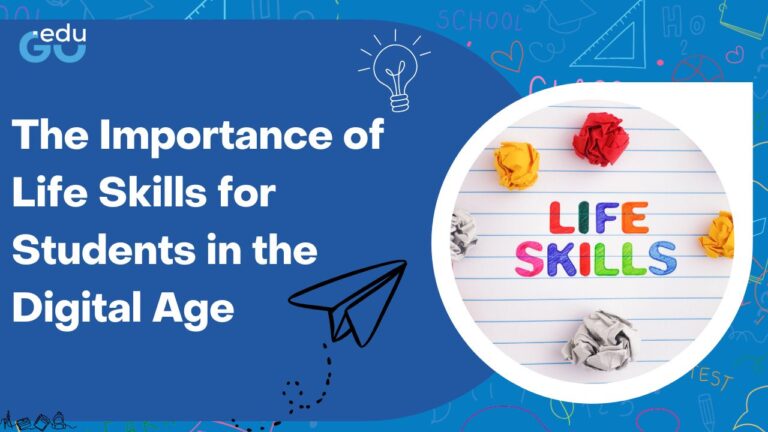In today’s fast-paced digital age, students face challenges and opportunities that require a unique blend of traditional knowledge and modern competencies. While academic excellence is important, life skills are equally vital in helping students thrive in a competitive and interconnected world.
For parents and students alike, understanding the importance of life skills is the key to unlocking personal growth, resilience, and success. Let’s dive into why these skills matter and how they prepare students for life in the digital era.
What Are Life Skills?

Life skills are a set of abilities that empower individuals to effectively handle everyday challenges. These include communication, problem-solving, decision-making, critical thinking, emotional intelligence, and adaptability.
In the digital age, these skills extend to managing technology use, digital literacy, and maintaining a healthy work-life balance.
Why Are Life Skills Important for Students?
Students who develop strong life skills can navigate the complexities of the modern world more efficiently. Here are some key reasons why they matter:
- Improved Decision-Making:
Students are faced with countless decisions daily, from choosing the right extracurricular activities to managing their time. Life skills enhance their ability to weigh options, predict outcomes, and make informed choices. - Boosting Confidence and Self-Esteem:
Mastering life skills instills confidence in students, empowering them to tackle challenges head-on and fostering a sense of independence. - Adapting to Change:
In a digital world that’s constantly evolving, adaptability is essential. Life skills teach students how to embrace change and innovate in the face of adversity.
Essential Life Skills for the Digital Age

To equip students for the future, parents and educators must focus on cultivating the following key life skills:
1. Digital Literacy and Online Safety
Understanding how to navigate the digital world responsibly is a fundamental life skill. Students must learn:
- How to use technology effectively.
- Recognizing and avoiding online threats like cyberbullying and scams.
- Maintaining digital privacy and ethical online behavior.
2. Emotional Intelligence (EI)
Emotional intelligence is the ability to understand and manage one’s emotions and empathize with others. This skill helps students:
- Build healthy relationships.
- Resolve conflicts peacefully.
- Stay resilient in stressful situations.
3. Critical Thinking and Problem-Solving
With an abundance of information at their fingertips, students must think critically to analyze data and solve problems effectively. Skills in this area help students distinguish between credible sources and misinformation.
4. Time Management and Organization
Balancing academics, extracurriculars, and personal life requires excellent time management skills. Students benefit from:
- Setting priorities.
- Using digital tools like calendars and task management apps.
- Avoiding procrastination.
How Life Skills Enhance Academic Success
The importance of life skills goes beyond personal development—they directly impact academic performance. Skills such as focus, discipline, and perseverance enable students to excel in their studies. Additionally, effective communication and teamwork prepare them for group projects and collaborations.
The Role of Parents in Building Life Skills
Parents play a crucial role in fostering life skills. Here are some practical ways to guide students:
- Encourage Open Communication:
Create a safe environment where students feel comfortable discussing their thoughts and emotions. - Promote Responsibility:
Assign age-appropriate tasks to teach accountability and independence. - Set a Positive Example:
Demonstrate resilience, empathy, and time management in your own life.
Teaching Life Skills Through Everyday Activities
Life skills can be taught through daily interactions and activities, such as:
- Encouraging students to participate in household chores.
- Introducing them to budgeting and financial planning.
- Using family discussions to teach negotiation and conflict resolution.
Integrating Life Skills into Education
Schools and educational institutions must also prioritize life skills development. Incorporating programs focused on leadership, teamwork, and problem-solving equips students to succeed both in and out of the classroom.
Challenges in Developing Life Skills in the Digital Age
The digital world presents unique challenges in life skills development, such as:
- Screen Time Overload: Excessive screen time can hinder face-to-face interactions and emotional development.
- Distraction and Multitasking: Students may struggle to focus due to the constant stream of notifications and information.
- Cybersecurity Threats: Understanding online safety requires consistent education and awareness.
Recognizing the importance of life skills in overcoming these challenges is crucial for success in the digital era.
Overcoming Barriers to Life Skills Development
Here are some strategies for overcoming these challenges:
- Limit Screen Time:
Encourage students to balance digital activities with offline pursuits like hobbies and sports. - Teach Media Literacy:
Help students identify credible information sources and understand the impact of digital footprints. - Encourage Mindfulness:
Practices like meditation and mindfulness exercises can help students stay focused and grounded.
Preparing Students for Future Careers
Life skills are indispensable in preparing students for the workforce. Skills such as adaptability, teamwork, and critical thinking are highly sought after by employers. Moreover, digital literacy ensures that students remain competitive in technology-driven industries.
The importance of life skills in shaping career paths highlights their role in creating well-rounded and employable individuals.
Conclusion: Building a Balanced Future
In the digital age, the importance of life skills cannot be overstated. These competencies empower students to navigate the complexities of modern life with confidence, resilience, and purpose.
By fostering these skills at home and in schools, parents and educators can prepare the next generation for a successful and balanced future.










